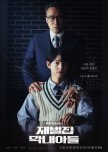This review may contain spoilers
My Defense Case for Reborn Rich. Because The Ending is Everything.
This drama is hands down the best I've watched from start to finish since "The Double." Coincidentally, both share intriguing themes of "rebirth" and "revenge," feature main characters with an almost superhuman intellect, and brilliantly relegate romance to the background – a choice I surprisingly wasn’t upset with giving how I love romance.
If you're reading this, swayed by mixed reviews or critical of the ending, allow me to present a different perspective. Prepare for a revelation: the ending of this drama is arguably one of the finest in recent Korean drama history. In fact, my focus here will be almost exclusively on this much-debated conclusion. While the initial episodes and core premise have received ample discussion and praise, the truly exceptional ending has been largely misunderstood. (A quick note: if you're sensitive to spoilers, I urge you to watch the drama first—it's a journey you won't regret—then return here for further insight.)
Korean dramas, as many of us know, possess an undeniable allure. Yet, a common frustration for me lies in their often-unconvincing finales. Too frequently, endings strive for "authenticity" or "dynamism" but devolve into overly dramatic, excessive, and needlessly explained conclusions that betray character development. This drama, thankfully, breaks that mold entirely. It’s not expected as endings of epic revenge plots should often be. It’s not “happily ever after” because it’s not a romantic comedy. Instead, it satisfies the purpose of the main character’s journey, and answers all of the viewers questions, all while not killing the ML… for a change. What more could you want?
In essence, the narrative centers on Yoon Hyun Woo, who, after a presumed death, mysteriously awakens as Jin Do Jun, the youngest grandson of the powerful Sooyang Group's owner, Ji Yang Cheol. Crucially, Jin Do Jun retains all his memories from his previous life as Yoon Hyun Woo, fueling his relentless determination to exact revenge on those who wronged him. His journey is arduous, but he navigates it with heroic resolve.
Given that greed propelled the Sooyang Group's elite to betray him, Yoon Hyun Woo (now Jin Do Jun) has a singular objective in his quest for vengeance: to prevent Ji Yang Cheol's children from seizing control of the Sooyang Group.
And he achieves this goal. Not once, but twice.
The widespread complaints about the ending are frankly perplexing. The finale's purpose of any if not all stories, must be to convey the moral of the story. And this moral was articulated with remarkable clarity and depth in “Reborn Rich”. It was, unequivocally, what must be labeled as a good ending.
I suspect much of the audience anticipated Yoon Hyun Woo continuing his life as Jin Do Jun after reaching his goal as “Jin Do Jun”. However, this perspective overlooks a crucial aspect of the narrative: while the drama employs elements of fantasy, these are purely instrumental, serving to propel the plot forward, and being the important factor to support the narrative message. The vast majority of the story is firmly rooted in realism, devoid of any further fantastical components. What must happen, happens, and no one can prevent it, as it is often what happens in real life. All the character’s play at being God, but none are. Thank you.
I confess, in the episodes following the beginning, I found myself questioning the lack of explanation for his "rebirth." The mechanism, the connection, the "why"—these were lingering questions. Yet, the compelling realism of the primary narrative kept me thoroughly engaged, patient, and optimistic that answers would eventually emerge. And they did, in a deeply satisfying manner. It wasn't a literal rebirth, nor was it conventional time travel. Instead, it was presented as a unique paranormal experience. Yoon Hyun Woo was in a coma, and within that state, he "lived" as Jin Do Jun, experiencing events in the same timeframe but seemingly transported back approximately 37 years. The drama masterfully executed this paranormal/time-slip concept. Crafting such a story without succumbing to overly didactic explanations is a significant challenge, one the writers commendably avoided. I applaud their refusal to yield to pressure, delivering a narrative that respects its audience's intelligence.
If viewers can embrace the understanding that his "rebirth" isn't a literal rebirth experience, but rather a "borrowed," unique experiential journey meant to transform the ML from within, they will undoubtedly grasp the true brilliance of this drama. Its essence wasn't about altering past events, and landing on top; it was about the profound journey of learning to be a better human being.
- Acting was good, some actors being a bit too dramatic but thankfully those were supporting cast.
- Rewatch value is low because this drama has a twist that makes for the whole experience. So, rewatching looses it's "punch" sorta speak.
If you're reading this, swayed by mixed reviews or critical of the ending, allow me to present a different perspective. Prepare for a revelation: the ending of this drama is arguably one of the finest in recent Korean drama history. In fact, my focus here will be almost exclusively on this much-debated conclusion. While the initial episodes and core premise have received ample discussion and praise, the truly exceptional ending has been largely misunderstood. (A quick note: if you're sensitive to spoilers, I urge you to watch the drama first—it's a journey you won't regret—then return here for further insight.)
Korean dramas, as many of us know, possess an undeniable allure. Yet, a common frustration for me lies in their often-unconvincing finales. Too frequently, endings strive for "authenticity" or "dynamism" but devolve into overly dramatic, excessive, and needlessly explained conclusions that betray character development. This drama, thankfully, breaks that mold entirely. It’s not expected as endings of epic revenge plots should often be. It’s not “happily ever after” because it’s not a romantic comedy. Instead, it satisfies the purpose of the main character’s journey, and answers all of the viewers questions, all while not killing the ML… for a change. What more could you want?
In essence, the narrative centers on Yoon Hyun Woo, who, after a presumed death, mysteriously awakens as Jin Do Jun, the youngest grandson of the powerful Sooyang Group's owner, Ji Yang Cheol. Crucially, Jin Do Jun retains all his memories from his previous life as Yoon Hyun Woo, fueling his relentless determination to exact revenge on those who wronged him. His journey is arduous, but he navigates it with heroic resolve.
Given that greed propelled the Sooyang Group's elite to betray him, Yoon Hyun Woo (now Jin Do Jun) has a singular objective in his quest for vengeance: to prevent Ji Yang Cheol's children from seizing control of the Sooyang Group.
And he achieves this goal. Not once, but twice.
The widespread complaints about the ending are frankly perplexing. The finale's purpose of any if not all stories, must be to convey the moral of the story. And this moral was articulated with remarkable clarity and depth in “Reborn Rich”. It was, unequivocally, what must be labeled as a good ending.
I suspect much of the audience anticipated Yoon Hyun Woo continuing his life as Jin Do Jun after reaching his goal as “Jin Do Jun”. However, this perspective overlooks a crucial aspect of the narrative: while the drama employs elements of fantasy, these are purely instrumental, serving to propel the plot forward, and being the important factor to support the narrative message. The vast majority of the story is firmly rooted in realism, devoid of any further fantastical components. What must happen, happens, and no one can prevent it, as it is often what happens in real life. All the character’s play at being God, but none are. Thank you.
I confess, in the episodes following the beginning, I found myself questioning the lack of explanation for his "rebirth." The mechanism, the connection, the "why"—these were lingering questions. Yet, the compelling realism of the primary narrative kept me thoroughly engaged, patient, and optimistic that answers would eventually emerge. And they did, in a deeply satisfying manner. It wasn't a literal rebirth, nor was it conventional time travel. Instead, it was presented as a unique paranormal experience. Yoon Hyun Woo was in a coma, and within that state, he "lived" as Jin Do Jun, experiencing events in the same timeframe but seemingly transported back approximately 37 years. The drama masterfully executed this paranormal/time-slip concept. Crafting such a story without succumbing to overly didactic explanations is a significant challenge, one the writers commendably avoided. I applaud their refusal to yield to pressure, delivering a narrative that respects its audience's intelligence.
If viewers can embrace the understanding that his "rebirth" isn't a literal rebirth experience, but rather a "borrowed," unique experiential journey meant to transform the ML from within, they will undoubtedly grasp the true brilliance of this drama. Its essence wasn't about altering past events, and landing on top; it was about the profound journey of learning to be a better human being.
- Acting was good, some actors being a bit too dramatic but thankfully those were supporting cast.
- Rewatch value is low because this drama has a twist that makes for the whole experience. So, rewatching looses it's "punch" sorta speak.
Was this review helpful to you?

























